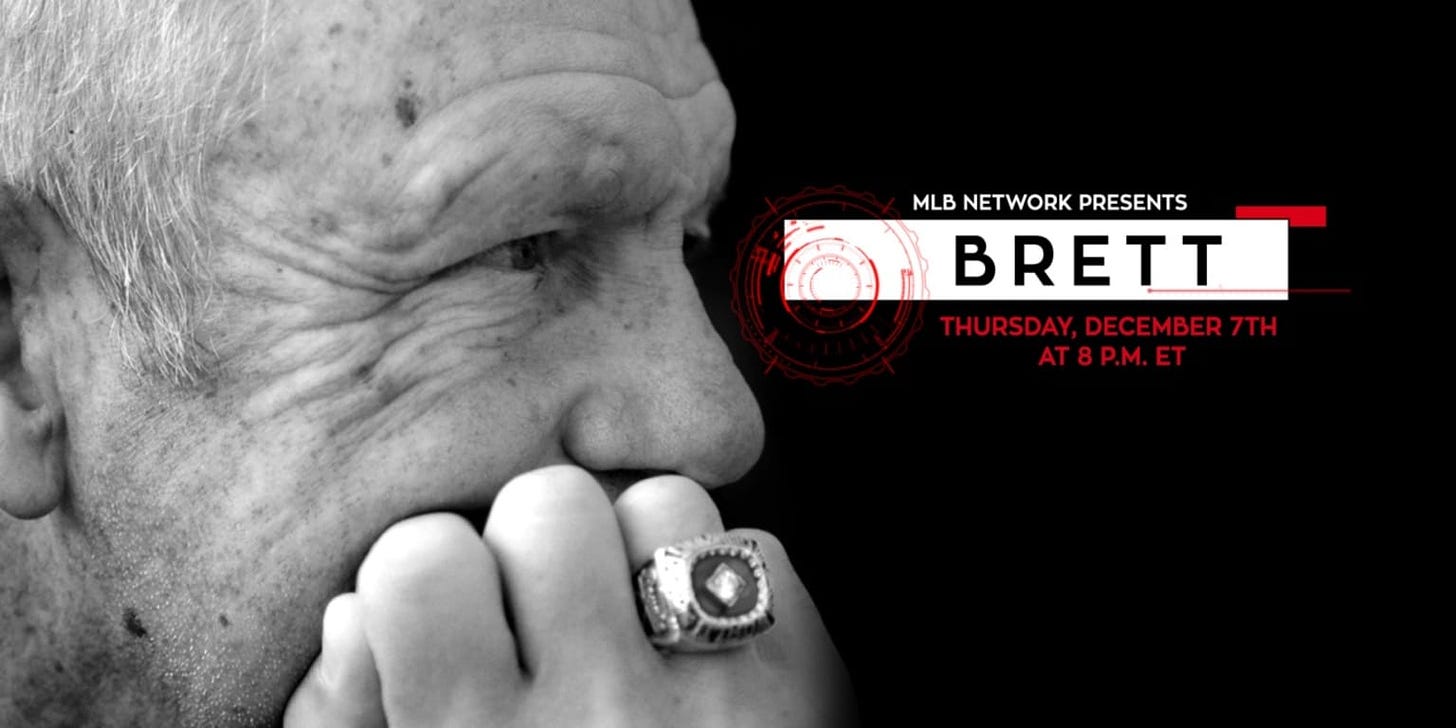Brett Is A Celebration of George Brett
Brett, which profiles Kansas City Royals Hall of Fame third baseman George Brett, is the latest MLB Network Presents documentary.
Brett is one of the greatest ballplayers to suit up in the #5 uniform, joining Joe DiMaggio, Johnny Bench, Brooks Robinson, Albert Pujols, and Hank Greenberg, to name a few. After establishing himself as a star by 1977, his name will forever be synonymous with Kansas City with the accomplishments he achieved while playing with the Royals for a team record 21 seasons. After hanging up his cleats in 1993, he took on a job as the Royals VP of Baseball Operations.
It’s a comprehensive documentary, featuring verité footage of the Hall of Famer in addition to the standard talking-head interviews, which include both teammates and Hall of Fame legends. Up until the film, Brett had never really been public about his relationship with his father or lack thereof. It wasn’t until a few months before being interviewed in which he had an epiphany that his father was an asshole. You can’t help but feel for him. Here’s one of the greatest baseball players of all time and nothing he did was seen as being good enough for his father.
The film covers the major moments during Brett’s career:
The Royals/Yankees rivalry during the ALCS in 1970s and early 1980s
After losing three straight ALCS during 1976-78, the Royals won the AL pennant in 1980.
Chasing .400 and winning the 1980 AL MVP
The Pine Tar Game
The 1985 World Series
His 3,000th career hit
Retirement press conference and farewell
Election and induction into the Baseball Hall of Fame in 1999
Because of the Yankees-Royals rivalry, we get a good amount of insight from Mr. October himself, Reggie Jackson. Jackson is joined by a pair of Hall of Famers, Mike Schmidt and Robin Yount. Like Brett, both Schmidt and Yount played their entire careers with one team. Schmidt’s Phillies took on Brett and his Royals during the 1980 World Series. But anyway, the Yankees-Royals rivalry cannot be discussed without mentioning the Pine Tar game. Schmidt said he would have gone out there but would have been nonchalant about it. Yount refers to it as “one of the iconic moments in the history of the game.” Jackson noted Brett’s intensity while commenting that it’s a great scene—by that point, Jackson was no longer with the Yankees and playing for the then-California Angels.
What’s amazing about Brett’s 1980 season and his chasing .400 is that he missed 44 games due to being injured. After his injury on June 10, he didn’t return until July 10. With all the pressure placed on him, he ended up falling a few hits short from joining Ted Williams in the .400 club.
Brett and the Royals finally won the World Series in 1985. While St. Louis fans still have gripes with umpire Don Denkinger, Brett offers his own comments on what happened during Game 6:
“The people in St. Louis to this day still think it was Game 7, because they think they lost the World Series on that call. They still drop the popup that inning. They still have a passed ball. And they still blame that on Denkinger…Don Denkinger, he made a bad call. If they call him out, we still might have won the game. You don't know. That was Game 6. Come out and play Game 7. That's all you had to do is play Game 7.”
The Cardinals, as the box score shows, did not show up to play during Game 7. Oh, they were on the field but the Royals had all the momentum after Game 6.
Late in his career, Brett joined the 3,000 hit club while on the road in Anaheim. A celebration would follow that night after a 4-hit game and then again in Kansas City. What surprised me is Brett’s reflection on a conversation with then-owner Ewing Kauffman. Kauffman asked Brett about his plans before saying that he thinks the third baseman should hang it up for a more deserving player. At this point, Brett had one more season left on his contract and came back mainly to piss off Kauffman. But by the All-Star break, he knew it was time to go and waited until later in the season to make it official. Fittingly, he got a hit in his final at-bat.
When Cooperstown finally came calling in 1999, Brett joined a class that included Nolan Ryan, Robin Yount, and Veterans Committee selection Orlando Cepeda.
“If I was to literally handpick players to go in with, I don’t think I could have picked a better group,” Yount said.
He’s not wrong. Growing up, I remember the 1999 ceremony being one of the first that I paid attention to because they were players that I watched at the tail end of their careers.
In order to get a full portrait of who Brett is like as a person, the documentary offers insight from wife Leslie and their oldest son, Jackson. Brett waited until later in his career to get married. In doing so, he was able to make it to his children’s games and such if he was in town. The Brett family makes an effort to have a family dinner every Sunday.
It’s weird to see a baseball doc that doesn’t feature Bob Costas but when you think about it, it makes sense why they include Joe Posnanski as the talking-head media commentator. After all, Posnanski has Kansas City credentials, having previously written for the Kansas City Star for over a decade. He’s not the only media figure in the film as Hall of Fame broadcaster Denny Matthews offers his thoughts on Brett’s career.
As for Brett, he has no regrets and if given the chance to do it all again, he would do things “exactly the same.”
Brett is another rock-solid installment of the MLB Network Presents line, working as an introduction to the Royals legend for a new generation of fans.
DIRECTOR: James Potocki
FEATURING: George Brett, Reggie Jackson, Mike Schmidt, Robin Yount, Willie Wilson, Joe Posnanski, Leslie Brett, Jackson Brett, Denny Matthews, Jamie Quirk, Frank White, Jeff Montgomery






